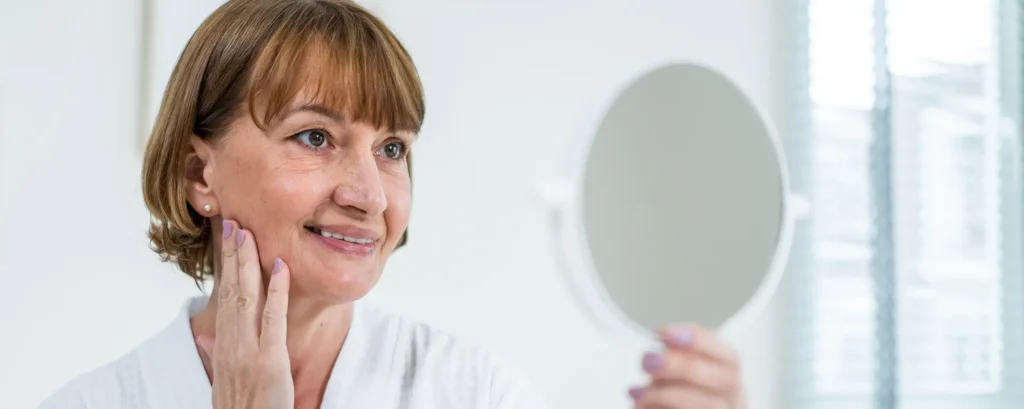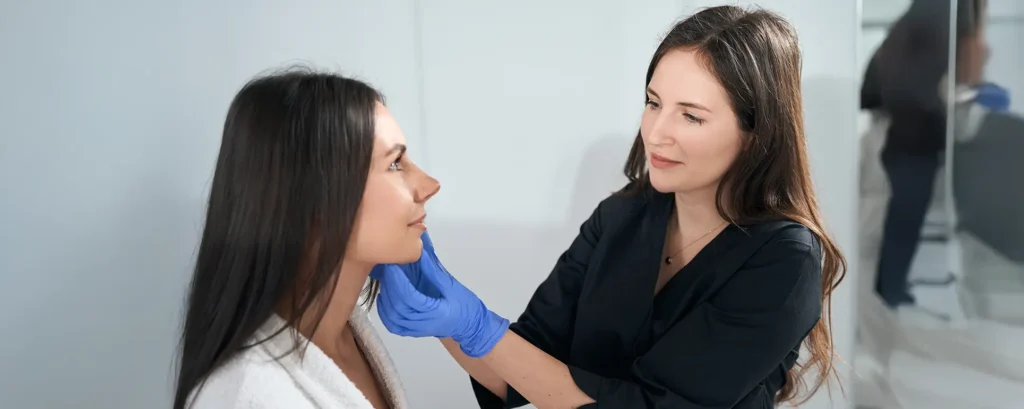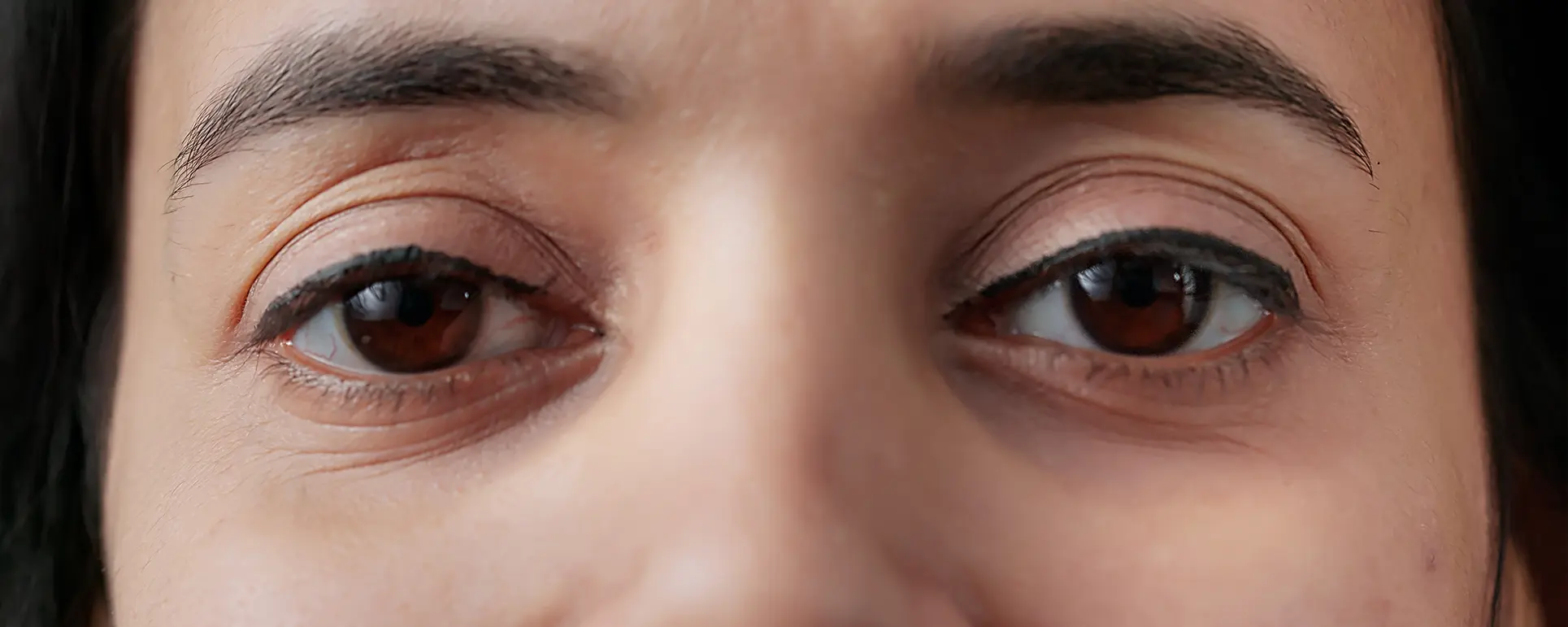Waking up with puffy eyes is a very common concern, and it can affect people of all ages. Few things are more frustrating than getting what feels like a good night’s sleep, only to wake up and find that your eyes look swollen, heavy, or tired. Puffy eyes can make you appear older, less rested, or even unwell, which often has a knock-on effect on your confidence throughout the day.
In many cases, morning puffiness is nothing to worry about. It often happens because the skin and tissues around the eyes are particularly thin and delicate, making them more prone to holding onto excess fluid while you sleep. Overnight, gravity, circulation changes, and fluid distribution in the body can all contribute to swelling. This is why you may notice puffiness most prominently when you first wake up, only for it to improve as you go about your day.
That said, persistent or recurring puffy eyes may point to more than just a harmless, temporary issue. Several factors can play a role. Fluid retention is a common culprit, which can be influenced by something as simple as a salty meal the night before or sleeping in a flat position. Allergies are another frequent cause, triggering inflammation and making the under-eye area appear swollen and irritated. Ageing is also a key factor, as the skin loses elasticity and the muscles supporting the eyelids weaken, making puffiness more noticeable over time.
Beyond these, lifestyle choices can’t be ignored. High sodium intake, dehydration, alcohol consumption, lack of quality sleep, or even staying up late on digital devices can all make morning swelling worse. Environmental factors such as pollution, seasonal changes, or exposure to irritants may also add to the problem. In rarer cases, chronic puffiness around the eyes may be linked to medical issues such as thyroid conditions or kidney problems, which is why paying attention to frequency and severity is important.
Understanding the different causes of puffy eyes is the first step to managing them effectively. By identifying your personal triggers whether that’s your diet, allergies, or natural ageing you can make targeted changes that help reduce puffiness and keep your eyes looking fresher. In some situations, consulting a dermatologist can provide clarity, as they can pinpoint the root cause and recommend treatments ranging from simple at-home remedies to professional interventions.
1. Fluid Retention

One of the most common explanations for waking up with puffy eyes is fluid retention. This happens when the body holds on to excess liquid, which then collects in the soft tissues around the eyes. Because the skin in this area is thinner and more delicate than anywhere else on the face, even a small amount of swelling becomes immediately noticeable. That’s why morning puffiness can sometimes look far worse than it actually is.
At night, your body’s circulation naturally slows as you rest. When you’re lying flat, gravity makes it harder for fluids to drain away from the face. Instead, they settle under the eyes, leaving you with that swollen, heavy look first thing in the morning. For most people, this puffiness improves as the day goes on and normal circulation resumes, but certain lifestyle and dietary factors can intensify the effect.
Some of the most common contributors include:
- High salt intake – Sodium plays a vital role in regulating the body’s fluid balance. However, consuming too much salt whether from processed foods, takeaways, crisps, or ready meals causes the body to retain more water than it needs. This excess fluid doesn’t just stay in the bloodstream; it seeps into surrounding tissues, particularly in areas like the eyelids where the skin is very thin. As a result, you may notice your eyes looking swollen or “puffed up” after a salty dinner the night before.
- Alcohol consumption – Alcohol has a dehydrating effect on the body, which may seem counterintuitive when talking about fluid retention. But when you’re dehydrated, your body goes into protective mode and begins storing whatever fluids it can to prevent further loss. This imbalance often shows up as puffiness around the eyes, and in some cases, it can also make dark circles appear more pronounced. A single night of heavy drinking is enough to trigger noticeable swelling the next morning, particularly if combined with a late night and poor sleep.
- Sleep position – The way you sleep also has a surprisingly big impact on fluid retention around the eyes. Sleeping on your stomach or side can encourage fluids to pool in the area closest to the pillow. This is why some people notice one eye looks more swollen than the other upon waking it usually corresponds to the side they’ve been sleeping on. Even sleeping flat on your back can contribute to puffiness if your head is not elevated, as gravity doesn’t help drain excess fluid effectively.
While fluid retention itself is not a serious health concern, its cosmetic effects can feel bothersome, especially if you wake up with puffiness often. The good news is that small adjustments can make a significant difference. Reducing salt intake, staying well-hydrated, moderating alcohol consumption, and using an extra pillow to keep your head slightly elevated can all help minimise morning swelling. For people who struggle with fluid-related puffiness despite these changes, applying a cool compress or chilled spoon to the eye area in the morning can also encourage drainage and reduce swelling quickly.
2. Allergies
Another frequent cause of morning puffiness is allergies. When your body encounters an allergen something it mistakenly identifies as harmful it responds by releasing histamines. These chemicals trigger inflammation, increase blood flow, and cause the tiny blood vessels around your eyes to leak fluid into the surrounding tissues. The result? Swelling and puffiness, often paired with redness, irritation, or watery eyes.
Allergic reactions can be triggered by a variety of sources:
- Pollen, dust, or pet dander: Seasonal hay fever, dusty bedrooms, or sleeping near pets can all irritate the eyes and lead to puffiness. Because you spend several hours in one environment while sleeping, exposure to allergens in your bedding or bedroom is a particularly common trigger for morning swelling.
- Certain skincare products or cosmetics: Eye creams, makeup, or cleansers that contain harsh fragrances or preservatives may cause irritation, especially for people with sensitive skin. Even products applied elsewhere on the face can migrate overnight, leading to under-eye puffiness by morning.
- Seasonal environmental triggers: Changes in temperature, humidity, or air quality can make allergy symptoms worse. For instance, in spring and summer, pollen counts rise dramatically, while in winter, indoor heating can dry the air and aggravate sensitive eyes.
What makes allergy-related puffiness different from other causes is that it’s often accompanied by additional symptoms. You might notice itchiness, redness, burning sensations, or frequent tearing. Rubbing your eyes, which many people instinctively do when they itch, can actually make swelling worse by further irritating the delicate skin around them.
Managing allergy-related puffiness usually starts with identifying and avoiding triggers. Washing your pillowcases and bedding regularly, keeping windows closed during high-pollen seasons, and using an air purifier can reduce exposure to common allergens indoors. Switching to hypoallergenic skincare and makeup products can also make a noticeable difference. For quick relief, applying a cold compress or cooling gel mask can calm inflammation and shrink blood vessels, helping to reduce swelling.
In more persistent cases, over-the-counter antihistamines or allergy eye drops can help control symptoms, but it’s always best to check with a doctor or dermatologist if puffiness is ongoing. They can determine whether allergies are the true cause or whether another factor might be contributing.
3. Skin Ageing

Ageing is another significant factor behind puffy eyes, particularly when swelling seems to linger rather than fade as the day progresses. As we grow older, the structures that support the eyes including muscles, ligaments, and connective tissues gradually weaken. The fat that normally cushions the eye can start to shift forward, creating the appearance of under-eye bags. What might once have been temporary morning puffiness can, with age, become a more permanent feature.
Several changes linked to the ageing process contribute to this effect:
- Loss of skin elasticity: Collagen and elastin, the proteins responsible for keeping skin firm and supple, decline naturally over time. With less elasticity, the skin under the eyes becomes looser, making any puffiness far more noticeable.
- Thinning skin: The under-eye area already has the thinnest skin on the body, and with age, it becomes even thinner. This makes underlying blood vessels and fluid retention more visible, creating a darker, puffier appearance that can be hard to mask with makeup.
- Fat displacement: The natural fat pads that provide youthful volume around the eyes can gradually shift out of place or bulge forward as tissues weaken. This displacement exaggerates puffiness and often results in the formation of permanent under-eye bags.
Unlike puffiness caused by fluid retention or allergies, age-related puffiness tends to be more persistent and less responsive to quick fixes. While cold compresses and lifestyle changes may help temporarily, they won’t fully reverse the structural changes happening beneath the skin.
That said, there are ways to manage the effects of ageing on the eye area. Using targeted skincare products with ingredients such as retinol, peptides, and hyaluronic acid can help improve skin firmness and hydration, making puffiness less obvious. Professional treatments such as laser therapy, dermal fillers, or even minor surgical procedures like blepharoplasty can provide more dramatic results by tightening skin, reducing fat displacement, or improving overall skin quality.
While ageing is a natural process that no one can avoid, adopting good skincare habits, protecting the skin from sun damage, and maintaining a healthy lifestyle can help slow these changes. Recognising when puffiness is simply a part of ageing versus when it may be caused by other health or lifestyle factors is key to finding the right approach.
4. Lifestyle and Sleep Patterns
The way you live day to day has a direct impact on how refreshed or puffy your eyes look in the morning. Your sleep habits, stress levels, and lifestyle choices all influence fluid balance, skin quality, and circulation, making them some of the most common yet overlooked contributors to under-eye swelling. While a single late night might cause temporary puffiness, repeated poor habits can make swelling a long-term concern.
Some key lifestyle-related factors include:
- Lack of sleep: Getting too little rest doesn’t just make you feel tired it also shows up visibly in your face. Inadequate sleep disrupts circulation and prevents your body from repairing itself overnight. This can cause blood and fluid to pool beneath the eyes, leading to both puffiness and dark circles. Chronic sleep deprivation also accelerates collagen breakdown, making the skin under your eyes thinner and more prone to swelling.
- Excessive crying: Tears are composed of water mixed with salt, and crying for extended periods can irritate the delicate skin around the eyes. When you cry, your tear glands produce an excess of fluid, which often accumulates in the surrounding tissues. Combined with rubbing the eyes which stretches and irritates the thin skin this can lead to significant puffiness that may last several hours after an emotional episode.
- Smoking: Smoking has a profound effect on skin health. It damages collagen and elastin, the proteins that keep skin firm and resilient, leading to premature ageing and making puffiness more noticeable. Smoking also restricts blood vessels, reducing circulation and oxygen supply to the skin. As a result, smokers are more likely to develop persistent under-eye bags, fine lines, and a dull complexion alongside puffiness.
Other habits can also contribute. Drinking too little water during the day can leave your body dehydrated, encouraging it to hold on to fluids. Eating late at night, particularly salty or processed foods, increases the likelihood of waking up swollen. Even sleeping without properly removing makeup can irritate the eyes and exaggerate morning puffiness.
The good news is that lifestyle-related puffiness is often the easiest to improve with small but consistent changes. Prioritising seven to nine hours of quality sleep, drinking plenty of water, moderating alcohol and caffeine, and avoiding cigarettes can significantly reduce swelling over time. Creating a calming bedtime routine such as limiting screen time, sleeping with your head slightly elevated, and ensuring your bedroom environment is clean and allergen-free can also make a noticeable difference in how refreshed your eyes look each morning.
5. Medical Causes

While puffy eyes are usually the result of harmless factors like fluid retention, allergies, or lifestyle habits, there are times when persistent swelling can signal an underlying medical condition. In these cases, puffiness is not simply a cosmetic issue but a symptom that needs to be properly investigated. Understanding when swelling might be linked to health concerns is important, as early detection can make treatment more effective.
Some medical causes include:
- Thyroid problems: Conditions such as hypothyroidism can affect the body’s ability to regulate fluid balance and tissue health. One of the visible signs may be swelling around the eyes or face. In certain cases of thyroid eye disease (often associated with autoimmune thyroid disorders), puffiness can be accompanied by bulging eyes, dryness, or irritation.
- Kidney or heart conditions: Both the kidneys and the heart play essential roles in maintaining fluid balance. When either organ is not functioning properly, the body may struggle to filter or circulate fluids effectively. This can lead to swelling in various parts of the body, including the delicate tissues under the eyes. People with these conditions often notice puffiness not only in the morning but throughout the day.
- Infections or inflammation: Eye infections such as conjunctivitis or styes can cause localised swelling, redness, and discomfort. Unlike ordinary puffiness, infection-related swelling is usually painful or tender to the touch and may affect just one eye. Sinus infections, which create pressure and inflammation around the eye sockets, can also contribute to noticeable puffiness.
It’s important to recognise when under-eye puffiness goes beyond the usual cosmetic nuisance. Warning signs include sudden swelling, puffiness that only affects one side of the face, pain or tenderness, vision changes, or puffiness that persists despite lifestyle changes. These symptoms may indicate that medical assessment is needed.
If you notice these signs, it’s best not to ignore them. Consulting a GP, ophthalmologist, or dermatologist can help determine whether the swelling is related to a medical condition or something more routine. Appropriate treatment may involve managing the underlying health issue, prescribing medication, or in some cases, referring you to a specialist for further evaluation.
How to Reduce Morning Puffiness
The good news is that in most cases, morning puffiness isn’t permanent. With a few simple adjustments and consistent habits, you can reduce swelling and help your eyes look fresher and more awake. While some remedies offer quick, temporary results, others focus on long-term improvements by addressing the underlying causes.
Here are some effective strategies to try:
- Apply a cold compress or chilled spoons: Cooling the under-eye area helps constrict blood vessels and reduce fluid build-up. Whether it’s a clean washcloth dipped in cold water, a gel eye mask kept in the fridge, or even two chilled teaspoons, cold therapy can significantly reduce puffiness within minutes.
- Reduce salt and alcohol intake: Since sodium and alcohol both disrupt fluid balance, cutting back especially in the evening can make a noticeable difference. Opting for fresh, unprocessed meals and replacing evening drinks with water or herbal tea supports better hydration and reduces morning swelling.
- Elevate your head while sleeping: Propping your head slightly with an extra pillow encourages fluids to drain away from the eye area rather than pooling overnight. For side or stomach sleepers, switching to sleeping on your back may also help balance fluid distribution.
- Stay hydrated and prioritise sleep: Drinking enough water throughout the day prevents the body from going into “fluid-retention mode.” At the same time, aiming for seven to nine hours of quality rest each night allows your body to repair itself, reduces stress on circulation, and prevents puffiness from becoming a daily issue.
- Use targeted eye creams: Skincare can provide short-term improvements when puffiness is more stubborn. Products with caffeine help tighten blood vessels, while hyaluronic acid provides hydration, plumping the skin and making swelling less noticeable. Other beneficial ingredients include peptides, which support skin firmness, and antioxidants, which protect against environmental damage.
Final Thought: Managing Morning Puffiness Effectively
Morning puffiness is common and often harmless, but understanding the underlying cause is key to effective management. From fluid retention to ageing and allergies, several factors can contribute to swollen eyes. If you want personalised advice and treatment options, you can get in touch with us to book a consultation with one of our expert dermatologists in London, who can assess your condition and recommend the most suitable approach.
References:
- Sami, M. S. (2007). Eyelid Edema. PMC – National Center for Biotechnology Information.
Accessed via NCBI: https://pmc.ncbi.nlm.nih.gov/articles/PMC2884828/ - Colvan, L. et al. (2019). Global periorbital skin rejuvenation by a topical eye cream. PMC – NCBI. Full text: https://pmc.ncbi.nlm.nih.gov/articles/PMC6850077/
- Brain Basics (National Institute of Neurological Disorders and Stroke) (n.d.). Understanding Sleep. NINDS. Access via: https://www.ninds.nih.gov/Disorders/Patient-Caregiver-Education/Understanding-Sleep
- Joshi, M., Perera, P. S., & Korrapati, N. H. (2021). Effective Home Remedies that Provide Quick Relief for Puffy Eyes. International Journal of Progressive Sciences and Technologies, 28(2), pp. 43–51. Link via ResearchGate: https://www.researchgate.net/publication/354871368_Effective_Home_Remedies_that_Provide_Quick_Relief_for_Puffy_Eyes
